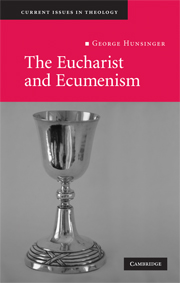Book contents
- Frontmatter
- Contents
- Acknowledgments
- Introduction: Ecumenical theology
- Part I Real presence
- 1 The bread that we break: controversies
- 2 The iron in the fire: a proposal
- Part II Eucharistic sacrifice
- Part III Eucharist and ministry
- Part IV Eucharist and social ethics
- Conclusion: Let us keep the feast
- Index
- References
1 - The bread that we break: controversies
Published online by Cambridge University Press: 05 June 2012
- Frontmatter
- Contents
- Acknowledgments
- Introduction: Ecumenical theology
- Part I Real presence
- 1 The bread that we break: controversies
- 2 The iron in the fire: a proposal
- Part II Eucharistic sacrifice
- Part III Eucharist and ministry
- Part IV Eucharist and social ethics
- Conclusion: Let us keep the feast
- Index
- References
Summary
No church should start down the road toward reunion, Hans Küng once remarked, without facing the imperative of conversion. He did not mean the conversion of one church to another, but a process that cut much deeper.
The road to unity is not the return of one church to another, or the exodus of one church to join another, but a common crossroads, the conversion of all churches to Christ and thus to one another. Unity is not the subjection of one church to another, but the mutual regeneration and mutual acceptance of community through mutual giving and receiving.
Greater mutuality among the churches through a deeper conversion to Christ, Küng believed, was the only way beyond the impasses of division. Ecclesial conversion would mean confronting significant challenges, sometimes painful, sometimes inspiring. Cherished traditions, venerable practices, hallowed institutions, and distinctive beliefs would need to be carefully scrutinized. No church should take the question of truth for granted. Here, again, Küng gave voice to the spirit of ecumenism. “All human truth,” he stated, “stands in the shadow of error. All error contains at least a grain of truth. What a true statement says is true; what it fails to say may also be true. What a false statement says is false; what it means but does not say may be true.” Looking for the grain of truth in every error, for the shadow of error in every truth, for the valid intention obscured in the false statement, and for the insight that has yet to be expressed – these are the practices necessary if the churches are to recover their visible unity in Christ.
- Type
- Chapter
- Information
- The Eucharist and EcumenismLet Us Keep the Feast, pp. 21 - 46Publisher: Cambridge University PressPrint publication year: 2008



